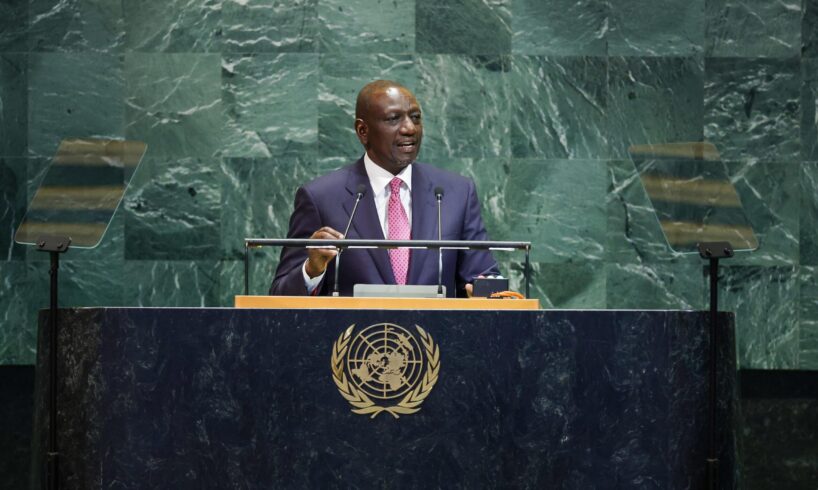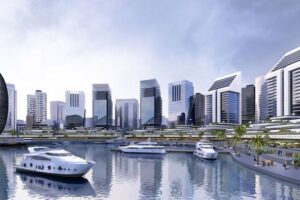
New York, USA Sep 24— President William Ruto used his address to the 80th United Nations General Assembly to deliver a blunt message: the UN must reform or risk “drifting into irrelevance.”
He argued that modernising the Security Council and overhauling the global financial system are not optional tweaks but the prerequisites for peace, climate delivery and equitable development — and he placed Africa’s representation at the centre of that effort.
“Institutions rarely fail because they lack vision,” Ruto said. “They drift into irrelevance when they do not adapt, when they hesitate to act, and when they lose legitimacy.”
From the League of Nations to UN @80: A Warning and a Choice
Ruto opened with a history lesson. The League of Nations collapsed not for want of ideals but for lack of enforcement and inclusion. Eight decades after the UN’s founding, he said, the system again faces a legitimacy test amid wars in Eastern Europe, the Middle East, the Sahel and the Horn of Africa, climate shocks, deepening inequality and technological disruption outpacing governance. Funding cuts and bureaucracy have sapped UN capacity, while the Security Council remains “frozen in the post-war structures of 1945, unable to act inclusively, with fairness and with speed.”
Yet he called the UN “one of humanity’s greatest achievements,” citing everything from famine relief and refugee protection to eradicating smallpox and coordinating global health responses — proof, he said, that multilateralism works when it is properly equipped and genuinely representative.
Africa’s Case: Two Permanent Seats — With Full Rights
Ruto’s core political demand was unambiguous: two permanent seats for Africa with full rights, including the veto, plus two additional non-permanent seats. Africa dominates much of the Security Council’s agenda, contributes significant peacekeeping contingents and bears heavy costs of instability, yet remains the only continent without a permanent seat.
“You cannot claim to be the United Nations while disregarding the voice of 54 nations,” he said, invoking the Ezulwini Consensus and Sirte Declaration that have framed the African common position for two decades. Reform, he argued, is not a favour to Africa but essential to the UN’s credibility and survival in the 21st century.
Haiti: Results on the Ground — and a Systemic Funding Failure
Pivoting from principles to practice, Ruto showcased Kenya’s 15-month leadership of the Multinational Security Support (MSS) mission in Haiti under Security Council Resolution 2699. The mission, he said, worked in a “volatile environment under enormous constraints,” operating under-funded, under-equipped and below 40% of authorised strength. Even so, he listed tangible gains: the Presidential Palace restored as the seat of government; the national police headquarters and academy secured; more than 700 recruits graduating; schools reopened; roads cleared of gang checkpoints; kidnappings sharply reduced; and both airport and seaport back to normal operations.
“If so much could be achieved with limited resources and stretched personnel within just 15 months,” he asked, “what more could have been accomplished if the United Nations fraternity had truly acted together in solidarity with the people of Haiti?” With the mandate “coming to an end in a few days,” Ruto urged a careful, orderly transition and “sustained, coordinated, undivided” international attention so hard-won gains are not lost.
Humanitarian Law Without Double Standards: Gaza and Sudan
On human rights, Ruto insisted the protection of civilians and respect for international humanitarian law “cannot be applied selectively.” He voiced Kenya’s grave concern over the humanitarian catastrophe in Gaza, called for the unconditional release of Israeli hostages, and backed a permanent ceasefire and a credible political process toward a two-state solution “where Israel and Palestine live side by side, in peace and in security.”
Turning to Sudan, he endorsed the Quad (Egypt, Saudi Arabia, the United Arab Emirates and the United States), saying there is no military solution. He urged all parties — including SAF, RSF and external actors — to respect Sudan’s sovereignty, unity and territorial integrity and rejected any attempts to divide the country.
Climate: The Threat — and Opportunity — Hinges on Finance
Calling climate change “the single greatest threat of our age” and also “one of the greatest transformation opportunities,” Ruto argued that ambition without affordable finance will not deliver. He highlighted Kenya’s progress — 93% of electricity generated from renewables (geothermal, wind, solar and hydro), along with investments in e-mobility, climate-smart agriculture, clean cooking, green manufacturing and circular-economy solutions. He pointed to Africa’s unified stance through the Nairobi Declaration (2023) and the follow-up at the second Africa Climate Summit in Addis Ababa “two weeks ago,” presenting Africa as a source of climate solutions, not merely a victim.
But implementation costs are steep: $56 billion to deliver Africa’s new NDCs. Ruto called on the global community to unlock the $300 billion agreed at Baku and accelerate negotiations toward a $1.3 trillion goal under the Baku-Belém Roadmap — and he tied this to a broader overhaul of the financial system.
“Fix the Money to Fix the Planet”: Reforming a System that “Punishes the Poor”
Ruto argued the global financial architecture “punishes poor countries while rewarding the rich.” As evidence, he cited the IMF’s most recent Special Drawing Rights allocation: 64% went to wealthy countries with little need for liquidity, while the poorest received just 2.4%. The outcome, he said, is a cycle of debt, high borrowing costs and inadequate emergency support that stalls climate action and development where it is most needed.
He proposed transforming Bretton Woods institutions into “genuinely independent, apolitical global bodies,” democratising decision-making and restoring credibility so the IMF and World Bank serve all countries fairly. In parallel, he spotlighted Africa’s own financial architecture: the Alliance of African Multilateral Financial Institutions (Afreximbank, Africa Finance Corporation, Trade and Development Bank, Shelter Afrique, Africa Re, ATIDI, ZEP-RE), and AU plans for an African Central Bank, African Monetary Fund and African Investment Bank, plus an African Credit Rating Agency that “understands our realities” and assesses risk with “fairness and truth.”
Don’t Abandon the UN — Renew It
Despite his critique, Ruto warned against cynicism: the UN remains humanity’s best chance at global solidarity, with unique legitimacy and convening power. From refugee protection to more than 70 peace operations and the global vaccination push, “the world can achieve together what no nation can accomplish on its own, however mighty.” Kenya — host to UN headquarters in the Global South — backs the Secretary-General’s UN@80 renewal agenda and stands ready to help drive reform.
“The 80th anniversary of the United Nations must be more than a commemoration,” Ruto said. “Let us seize this moment to re-imagine and rebuild the UN into a body that commands legitimacy, responds with speed, and delivers justice for all.”




